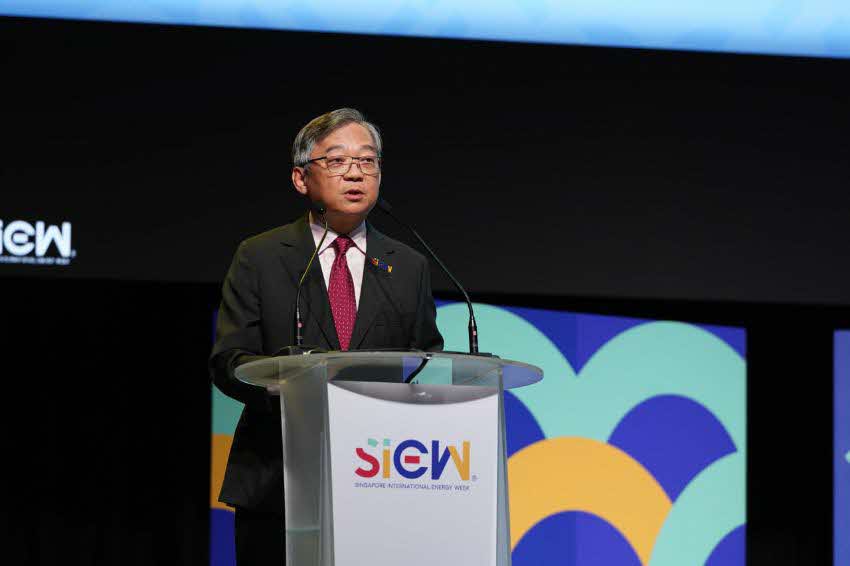In the global effort to reduce carbon emissions, Singapore is taking decisive steps towards a sustainable energy transition. Sher Wei Kwok reports.

The world is watching as conflicts in the Middle East heighten concerns about energy market volatility. Against this backdrop, the imperative to combat the climate crisis and reduce carbon emissions becomes increasingly urgent. In his Singapore Energy Lecture delivered on 23 October at SIEW 2023, Minister for Trade and Industry Gan Kim Yong emphasised the need for global action to shift towards cleaner energy sources.
With the window for limiting global warming to 1.5°C narrowing, Singapore is taking decisive steps to address this challenge. Minister Gan outlined the nation's approach to developing a net zero energy system.
Safeguarding energy security throughout the energy transition
Minister Gan emphasised the importance of energy security in the transition to a net zero future, stating that "the world is likely to experience more frequent episodes of volatility as the energy transition progresses. That is why having secure and stable energy markets is integral to the energy transition effort".
To this end, the Energy Market Authority (EMA) has taken specific measures that include:
- Facilitating private investments. EMA is implementing a centralised process to facilitate and guide private investments in new energy generation capacity;
- Consumer protection. Stringent regulatory requirements have been introduced for electricity retailers to ensure better consumers protection; and
- Price stabilisation. A Temporary Price Cap Mechanism (TPC) has been instituted to prevent extreme price fluctuations.
Additionally, the Singapore government plans to aggregate gas demand from power generation companies, centralising gas procurement and supply to the power sector. This move aims to create economies of scale, leading to favourable gas contracting terms, diversified gas sources, longer-term contracts, and ultimately, stable prices and supply.
Investing in low carbon alternatives
Recognising Singapore’s challenges as an energy-disadvantaged nation, the Government is investing in promising low carbon alternatives to green its power supplies and decarbonise its economy. Minister Gan highlighted two key technologies:
Hydrogen. Ammonia, as a hydrogen carrier, has emerged as a frontrunner due to its technological maturity and established international supply chain. EMA and the Maritime and Port Authority of Singapore (MPA) launched an Expression of Interest (EOI) late last year for a small-scale commercial project utilising low-carbon ammonia for power generation and bunkering. The overwhelming response from 26 proposals demonstrates the industry's strong interest. EMA and MPA have shortlisted six consortiums for participation in a closed Request for Proposal (RFP). The selected lead developer will work with government to jointly develop the proposed end-to-end ammonia solution. This will pave the way for one of the world's first commercial applications of ammonia as a fuel.
- Nuclear. While Singapore has not yet made any decision regardingnuclear energy deployment, it recognises nuclear energy'spotential. As such, it is building capabilities to understand advanced nuclear energy technologies and their suitability for Singapore. Small Modular Reactors,touted as safer than conventional large-scale reactors, are under review, as are aspects of nuclear safety and emergency preparedness and response.
Evolving energy systems
Transitioning to low carbon energy sources necessitates the evolution of energy systems. Minister Gan shared three key strategies to achieve this.
- Public-private sector collaboration. The Government will work closely with the private sector to plan, coordinate, and facilitate investments across the energy value chain.
- Regulatory reviews. Regulators will need to assess the suitability of existing market mechanisms to ensure effective competition and certainty for the private sector.
- Energy efficiency. All stakeholders, from businesses to individuals, have a part to play in energy efficiency and demand management.
A call to action
Minister Gan concluded with a call to action for governments, businesses, and individuals to take collective responsibility to drive the energy transition and meet climate targets. Towards this end:
- Governments must establish robust policies and market frameworks, both domestically and internationally, to advance decarbonisation.
- Businesses are encouraged to collaborate closely with research institutions to develop commercially viable low carbon solutions.
- Individuals are urged to make lifestyle adjustments to reduce energy consumption where possible.
While the energy transition is undeniably complex and challenging, Singapore is committed to greening its power sources and transforming its energy system. Minister Gan's message underscores that every individual has a role to play in leaving behind a greener and more sustainable world for future generations.
Follow us on X (formerly Twitter) and Telegram to get the latest updates.